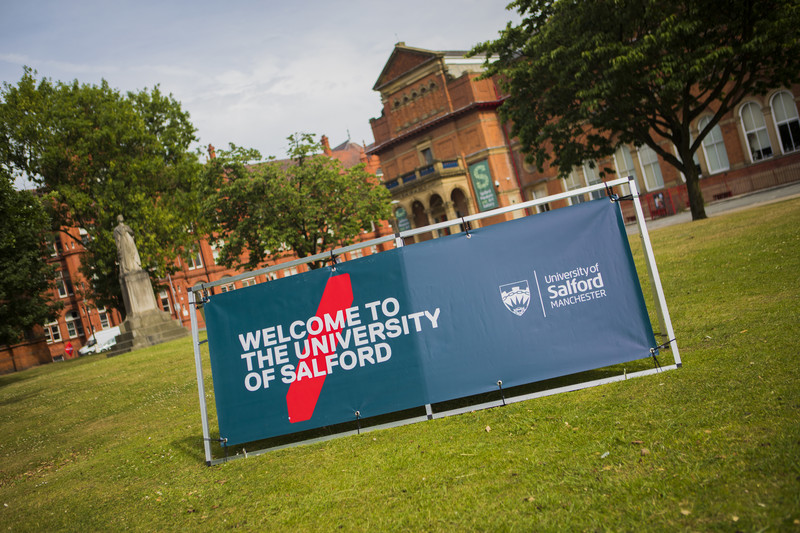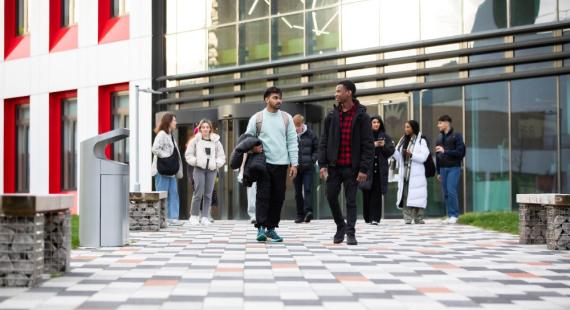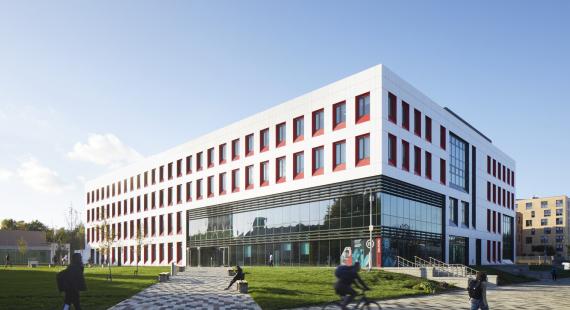Postgraduate research
At the University of Salford, we are committed to solving many of the complex challenges society faces today, through pioneering challenge-led research and solutions-focused enterprise. Our innovative research environment is recognised around the world, offering PGR researchers the platform to establish a profile and develop international networks.
We have a large community of research students across our different research centres. All our researchers have access to our Doctoral School, where we offer student support and training to help you become the best researcher you can be.
Choosing the right university is a big decision, so take a look at the information below to find out more about becoming a PhD student at Salford and how this can support your plans for the future.
What is a research degree?
A research degree offers you the chance to become an expert in the field that you are passionate about. It also provides you with the opportunity to examine and investigate an innovative and novel area of research.
You will shape the future through innovation, whilst developing specialist skills that you can apply to the workplace.
Under the guidance of our supervisors, you’ll take full responsibility for your work and given the freedom to make your own contribution to your chosen subject area or research. At the University of Salford we offer several research degrees:
- Master's level research degrees - these include Master of Science by Research (MSc by Research) and Master of Philosophy (MPhil) courses.
- Doctoral degrees - these include PhD, DProf and DBA. These are the highest academic degrees awarded by universities in the UK.
The length and structure of a research degree depends on the pathway and course chosen. Download our postgraduate research study guide to find out more about the different options available.
Our research specialisms
Our thriving research centres are based across our four academic schools. Take a look at your area of interest below to find out more about our research culture, academic strengths and the opportunities available to you at Salford.
Our research centres
Arts, Media and Creative Technology
Our School of Arts, Media and Creative Technology attracts students from across the world, creating a vibrant and dynamic research environment, encouraging collaboration, interdisciplinary practice and international networking.
Salford is a great environment for Arts, Media and Creative Technology researchers as we engage with the real-world impacts of 21st century challenges, offer world-class performance and exhibition spaces in our New Adelphi building, and unite researchers, artists, designers, and other creative practitioners in the Salford International Innovation Studio at MediaCity.
Research areas
- The Creative Technologies Research Centre explores the crossover between creative practices and emerging technologies, focusing on research projects that use technology in areas such as film, music, performance, broadcasting, games, immersive media, artificial intelligence and machine learning.
- The English Research Centre and our centre for Practice as Research recognise the importance of linking their research with cultural life outside of the University as they take an innovative approach to exploring hybrid and inter-disciplinary ways of working through their examination of marginal, experimental and emergent practices. Their work is critically engaged and culturally relevant as they focus on the readings of neglected and transgressive authors and cultural practices: from writings of conflict in Northern Ireland to Victorian Sensation fiction, from discontented minds in Early Modern Drama to the representation of serial killers in film and fiction, from African modernism to the hidden meanings of place names.
- The Politics and Contemporary History Research Centre is interested in a variety of political and historical themes grouped around the field of International Security in the broadest sense. Our staff also have research interests around European party politics, ideologies and intelligence studies, military history, counter-insurgency, counter-terrorism, and several other aspects of international politics and security around Europe, the Middle East, Latin America and Asia.
- Art and Design Research and Engagement (Design Against Crime Solutions). This area of research unites senior, proactive researchers and emerging, early career researchers who engage in theoretical and practice-based creative investigations across a range of art and design areas, from design for health and wellbeing to games for social change to design against crime.
Get in touch
For more information about postgraduate research in Arts, Media and Creative Technology, email pgr-supportsam@salford.ac.uk
Business, Management and Law
Salford Business School inspires postgraduate researchers to be curious, think critically and challenge assumptions in ways that equip them with the personal and professional qualities valued by academic and industry employers alike.
We broadly align to the University’s overall Innovation Strategy, with an emphasis on business change, entrepreneurial thinking, FinTech, ethical and sustainable working and digital transformation. Our Centre for Sustainable Innovation enables businesses to access cutting-edge research, expert guidance and a supportive environment in which to learn and collaborate.
We want to encourage and develop the next generation of researchers who want to make a difference, bringing together disciplines, and challenging existing ways of thinking and viewing the world of business, organisations and beyond.
Get in touch
To find out more about postgraduate research in Business, Management and Law, email pgr-supportsbs@salford.ac.uk
Health and Society
Research in the fields of Health and Society at Salford is structured into three centres:
- Centre for Human Movement and Rehabilitation
- Centre for Applied Health Research
- Centre for Research on Inclusive Society
Get in touch
For more information about postgraduate research in Health and Society email pgr-supportshas@salford.ac.uk
Science, Engineering and Environment (SEE)
By choosing SEE, you’ll be joining a large aspirational community of postgraduate researchers exploring topics across a suite of interdisciplinary research centres. Whether you’ve been planning your research for a while, or you’ve found fresh perspectives during the pandemic, the University of Salford is ready to help start your research journey.
The School of Science, Engineering and Environment (SEE) brings together a variety of research fields:
- Autonomous Systems & Advanced Robotics (ASAR) that includes autonomous vehicles and new robotics innovations such as soft robotics.
- The Informatics Research Centre with a focus on computing and engineering sciences, which includes computer and data sciences, Artificial Intelligence, software engineering, and cybersecurity.
- The Life Sciences are supported by two research centres, the Environmental Research and Innovation Centre that encompass sustainable natural environments and infectious diseases, and the Biomedical Research and Innovation Centre that focuses on biomedical aspects such as cancer diagnosis, prevention and cardio-respiratory physiology.
- Our Energy House laboratories focus on research into sustainable built environments and the progress towards low carbon and net zero housing design, and explores topics such as the impact of the environment, building materials and smart technology on energy consumption in homes.
If you have an enquiry about our research opportunities, email pgr-supportssee@salford.ac.uk
Find a supervisor
To find a potential supervisor for your research project, search for your specialism in our staff directory and view our academic profiles which most closely match your research interests.
Doctoral School

Our Doctoral School brings our PhD students together and supports our vibrant community in which collaborative and interdisciplinary working can flourish. What makes us so unique is not only the breadth and success of our research community, but also the students that we attract. People join us from all over the world, at all stages in life, adding their life experiences and unique ways of approaching research to our collective knowledge and expertise.
Postgraduate researchers choose Salford to explore the research topics they’re passionate about. They take advantage of the excellent training and support that is tailored to their individual needs and our development opportunities that enable them to fulfil their potential.
We also have a dedicated pastoral support service, askUS, to ensure all our students have access to the advice and guidance they need whenever they need it, whether it’s about finance, visas, or faith services.
Training and events
Whilst studying a postgraduate research degree at Salford, you can access support every step of the way. Not only will you be supported by a personal tutor who is also an academic, but most importantly you will be working with experienced supervisors who are publishing in the same area of research.
We have also developed COMPASS, our Community Model for Postgraduate Achievement, Skills and Future Success, which is an accessible, inclusive, and community-driven training programme tailored to the goals of our postgraduate research students. It is designed to help you develop the professional and personal skills needed for effective research whilst also enhancing your future employability. This is important whether you’re planning a career in academia or in the public or private sectors.
You'll also have the opportunity to participate in our annual research conference, SPARC, a two-day event open to all postgraduate researchers to share ideas and experiences, take part in workshops, and hear from key note speakers on a variety of topics.
Postgraduate research students who also attend international and UK conferences and are presenting a paper, poster or other form of presentation are eligible to apply for the Doctoral School Conference Fund. Successful applicants can receive a contribution of up to £1000 for travel and accommodation.
Why study at Salford?
By studying at Salford, you will be joining a large community of research students across our different research centres. All of our researchers have access to our dedicated Doctoral School which offers specialist student support and training to help you become the best researcher you can be.
Find out what life at Salford would be like.
Fees and funding
You will need to pay annual tuition fees, which vary depending on the programme you’re studying. We offer a range of discounts to our postgraduate research students including a 20% reduction if you’re a Salford graduate and choose to continue your studies with the University. We also currently have scholarships available to help with the cost of your studies.
You can find out more about fees, including the discounts you may be eligible for, on our postgraduate research fees and funding page.
How to apply
Applications for postgraduate research degrees are centered around your research proposal. To help you with this, we've outlined important dates, the information we require, tips on constructing your proposal and the contact information for each school's admissions team in the link below.
Postgraduate open days

If you would like more information on our postgraduate degrees, you are welcome to join us at any of our events. We have a range of events throughout the year, from Open Days to campus tours, and Q&A sessions, so there’s always an opportunity to get your questions answered.


